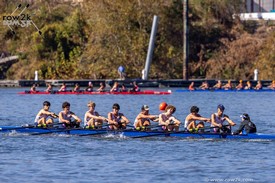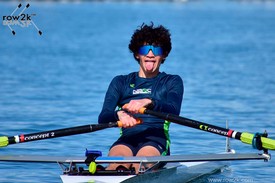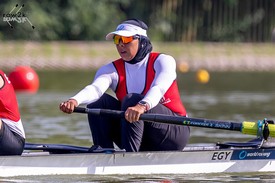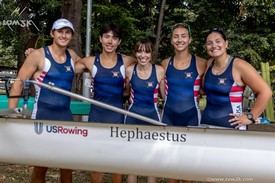When Tiff Wood first told me about the CPR, a 115-mile endurance row on Oregon' s Willamette River, I immediately commited myself to doing it, even though the furthest I had ever rowed in one sitting was something like eight miles. My morbid sense of curiosity got the best of me. What I really wanted to know was, after hours and hours on the water, when my oar inevitably became like the white-hot end of a farrier's iron in my palms, once my skin had blistered and ripped away, exposing raw and bleeding flesh, would I have the resolve to finish what I had begun?
I knew, of course, that Tiff would, even if all he had to grip his oars with was two bloody stumps. After all, this is the guy who famously pulled so hard during a warmup for the 1983 World Championships that he cracked a rib, competed five days later, and still won a bronze in the single. I've worked out with Wood now, in my diminished capacity as the sole lightweight at Portland's Willamette Rowing Club, for two seasons now. I can assure you that even though the Hammer's pushing fifty and has been retired from Olympic competition for fifteen years, he's no less-formidable a competitor. Every time he puts his hands to an oar, he sacrifices himself completely to the act of rowing, even during routine drills, when the only thing at stake is the readout of the Stroke Coach at his feet. Rowing behind or alongside Wood, it's almost frightening to watch him turn inside himself, locked in mortal combat with his oar, as though he's trying to bend it, break it, before it tears him apart, just like that old college photo from "The Amateurs."
The Corvallis-to-Portland Row--the CPR--is Tiff Wood's attempt to push the limits of rowing, to take an activity that is already extreme by its very nature and make it even more so. After all, the fastest crews cover the three-mile course of the Head of the Charles in a bit more than fifteen minutes; what Wood was proposing would taking something like fifteen hours.
In the months before the first CPR (which was rowed in May, 1999), I did what I could to prepare myself. When I wasn't practicing in the club's eight, I spent an additional two hours in Oregon Rowing Unlimited's erg house, once counting each of the two-thousand six-hundred and forty three strokes I took. One weekend, when my wife was away with the car, I rode my bike twelve miles to a boathhouse in Lake Oswego for a two-hour coached session in a single on the Willamette, biked home, uphill, then, after the phone rang, biked to a trailhead and joined a friend for a ten-mile hike. I spent the next day, Sunday, my rest day, outside in a rain storm, carving three raised beds out of the clay soil in front of my house, a process that involved carting a wheelbarrow loaded with sodden muck down a wooden plank, jogging to the end of the driveway, crossing a road, dumping the mess down a hill, shoveling black dirt into the wheelbarrow, sprinting back up the plank with the laden wheelbarrow, emptying it, and doing it all again. Fifty-three times, without rest, with the CPR in mind, until the garden, after six hours, was finished.
After twelve weeks of similarly frenetic activity, I still felt woefully unprepared. On the eve of the CPR, I lay awake, exhausted, worried. In the middle of the night, I busied my mind by taping my hands, doing what I could to ward off the specter of an oar flaying my palms.
The tape lasted forty minutes. It rolled off barely ten miles from the start in Corvallis. Another hour passed before I felt the telltale heat of blisters forming on the tips of my fingers. Even more distressing though, was the fact that out of the seven boats Wood had assembled to test the course, mine, which everybody had assumed would be the fastest, was sixth, and lagging further and further behind. I was rowing in the three seat of the Willamette eight; Tiff was in a double with his sculling partner, Bill Byrd, a 1975 Pan Am Games gold medalist. Wood and Byrd were out in front pushing the pace, already a quarter-mile ahead, racing two other doubles. We regrouped during a scheduled break thirteen miles later, floating in the shadow of thirty-foot sandstone cliffs. Being the unapologetic lightweight wuss that I am, I dug into my dry bag, uncapped a tube of skin lubricant, greased my fingers and palms, and slid on a pair of tight-fitting full-finger gloves.
The gloves kept the blisters from multiplying for maybe another twenty miles. During this time, we were alone on the river, still behind, surrounded on both sides by berms of rich topsoil. We rowed in silence, a silence unbroken except for the curious pop of a distant shotgun, and the rhythmic thunk of eight oars simultaneously rotating in their locks. Like a fog, the pain accumulated in layers: lactic-acid pooling in thighs and forearms, a tightness in my lower back and hamstrings, a cramp in my right palm, needles in my left. Eventually, though, the layers of pain merged into something that was singular, manageable, almost comfortable.
My gloves came off in the middle of a piece with another eight from Corvallis. As the bow of my boat crossed under the shadow of a highway bridge, out of the corner of my eye I noticed a submerged log that the current had pinned against the bridge's concrete piling, which, although immobile, cleaved water like the prow of an oceanliner at full steam. Shouts. Bangs. My seat shuddered three times. We drifted alongside the other eight, which had also struck the log. Foundering, we paddled to a beach, removed our oars, and lifted our boat from the water. It was missing its skeg and had sustained an arm's-length gash in its bow; the other boat, beached nearby, had a hole near its mangled rudder. There was nothing to do but bake in the noontime sun. Our neighboring castaways from Corvallis cranked the volume on their cox box and converted their useless Dirigo into a karoake machine. Most of my boatmates slept in the sand, in the company of a dozing drunk, while I sat alone at the water's edge and chucked stones into the river, graduating to bigger and bigger ones as the minutes passed and it became increasingly clear that the others weren't coming back, that the most difficult leg of the CPR would be rowed without us. After three hours, help arrived, in the form of a boat trailer. We rode in silence to the day's endpoint, a state park forty miles downriver from our beach, eighty-seven river miles from where we had started.
I sulked around the campground for an hour before I decided to go down to the dock. Somebody shouted as the first of five boats glided around the bend. Then I was lost in a confusion of oars and boats and damaged bodies; the dock took on the frenetic aura of an emergency room in crisis, with volunteers rushing to assist the wounded. Worst were the hands; most palms resembled third-degree burns. A sculler from the Portland Boat Club paced back and forth and in the manner of someone who has just walked away from a plane crash, kept saying, "I don't know what I need right now...I don't know what I need." Clearly something unspeakable had happened to these people during the miles I had missed. I needed to understand, so I found Wood, and asked. He forced a wan smile. "At some point, you row just to survive," he said, mysteriously, then walked stiffly up the gangway to find his tent, and the sleep he'd need before rowing the final twenty-eight-mile stretch in the morning, leaving me alone with my thoughts.
A log slid by in the middle of the river. It probably arrived in Portland before daybreak. But I can't be sure. There are some things I'll never know.
If you enjoy and rely on row2k, we need your help to be able to keep doing all this. Though row2k sometimes looks like a big, outside-funded operation, it mainly runs on enthusiasm and grit. Help us keep it coming, thank you! Learn more.
- Bont Rowing
- Calm Waters Rowing
- Concept 2
- Craftsbury Sculling
- The Crew Classic
- CrewLAB
- Croker
- Durham Boat Co.
- Empacher
- Faster Masters
- Filippi
- Fluidesign
- h2row.net
- HUDSON
- Live2Row Studios
- Nielsen-Kellerman
- Oak Ridge RA
- Peinert Boat Works
- Pocock Racing Shells
- Race1 USA
- RowKraft
- Rubini Jewelers
- Vespoli USA
- WinTech Racing
- Bont Rowing
- Calm Waters Rowing
- Concept 2
- Craftsbury Sculling
- The Crew Classic
- CrewLAB
- Croker
- Durham Boat Co.
- Empacher
- Faster Masters
- Filippi
- Fluidesign
- h2row.net
- HUDSON
- Live2Row Studios
- Nielsen-Kellerman
- Oak Ridge RA
- Peinert Boat Works
- Pocock Racing Shells
- Race1 USA
- RowKraft
- Rubini Jewelers
- Vespoli USA
- WinTech Racing

















